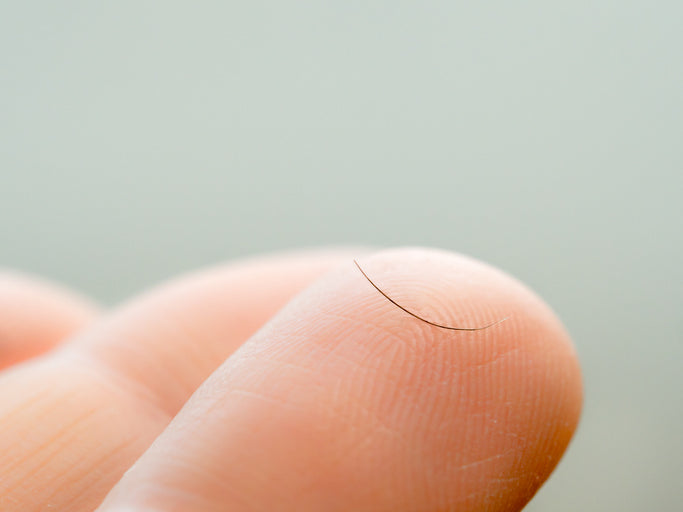Stomach acid is essential to proper digestion. Low stomach acidity, also known as hypochlorhydria, inhibits the proper absorption of necessary nutrients and vitamins. Low stomach acid also leaves the body vulnerable to infection, and having an imbalance in stomach acid levels can cause digestive problems.
And, if you’re suddenly noticing that your hair is looking, well, a little sparse, that nagging sensation in the pit of your stomach could signify more than just belly woes. In fact, there may be a direct connection between low stomach acid and hair loss or thinning hair. Plus, information on the best products you should use to combat thinning hair.
#include-related-slider#
What Stomach Acid Does
“A low stomach acidity level will prevent your food from being digested properly, leaving your body with nutrient deficiencies, including a lack of amino acids and minerals that it needs to promote healthy hair, scalp and skin,” said St. Jean. “What this means is that even if you are eating the right foods and taking the right multivitamins, if your stomach acid levels are not where they should be, they will not be having the impact on your overall health, including your hair, scalp and skin, that they should and could be.”
Related: Here’s How Gut Health and Hair Loss are Related
What Happens When Stomach Acid Dips
If stomach acid levels get too low, a range of noticeable symptoms can occur — and those signs are not necessarily only found within the gut. The following are among the most common symptoms of low stomach acid:
- Bloating, gas, diarrhea
- Acid reflux or heartburn
- Skin problems
- Undigested food within the stool
- Nutrient deficiencies
- Hair loss, thinning hair or brittle fingernails
- Food allergies or intolerance
- Leaky gut syndrome
Read: 12 Yoga Poses for Better Digestion
Stress SOS
Other causes of low stomach acid levels may include:
- Age, as acid levels may decrease as we grow older
- Long-term use of antacids and proton pump inhibitors used to treat ulcers and acid reflux
- Infections such as H. pylori which is a common cause of stomach ulcers
- Increased sugar intake
Adding stress-busting techniques such as regular exercise, yoga, meditation or breathwork may be just what the doctor ordered to minimize the negative symptoms.
Related: Everything You Should Know About Stress and Hair Loss
8 Signs of Low Stomach Acid
While most signs of low stomach acid are related to your digestive system, some are not. Here's what you should look for.
1. Bloating, Gas or Diarrhea
When stomach acid levels are low, food is not broken down properly. This, in turn, increases gas production, leading to that uncomfortable feeling of bloating. Excessive flatulence or bloating is a sign of hypoacidity.
2. Acid Reflux and Heartburn
Another common side effect of low stomach acid is heartburn or acid refuel. According to The Mayo Clinic, gastroesophageal reflux disease or GERD isn’t necessarily caused by an acidic stomach. Instead, that painful burning sensation is likely connected to symptoms within the GI tract caused by low stomach acid. Without enough of this helpful stomach acid to break down food, poorly digested food can get into the GI tract and cause GI pathogens to overgrow.
#include-related-slider#
3. Skin Problems
A healthy gut helps keep your skin healthy. Low stomach acid leads to excessive bacteria growth, which can cause skin issues such as acne or even yeast infections.
4. Undigested Food in the Stool
If you notice undigested food in the stool, it's highly likely that your stomach acid levels are low. One of the most noticeable effects of low stomach acid is the way it interferes with the ability to digest or break down nutrients, especially protein, into digestible amino acids. This lack of acid in the stomach may lead to folic acid or amino acid deficiencies, as the absorption of key nutrients is lacking.
5. Nutrient Deficiencies
In some cases, digestive problems in protein digestion can lead to a protein deficiency, which can, in turn, cause deficiencies in vitamin B-12, iron, magnesium and zinc. Vitamin B-12, for example, needs help from stomach acid to detach from the protein that carries it. If it doesn’t detach, it can’t bind with other substances that carry it through the intestinal wall and into the bloodstream. The body requires both B vitamins and iron for healthy red blood cells. Consider taking supplements such as GRO Biotin Gummies
6. Hair Loss, Thinning Hair or Brittle Fingernails
A vitamin B-12 deficiency can also cause hair loss or thinning hair, as well as other symptoms such as brittle nails. If you notice more hair on your brush or sink, along with a topical serum like GRO Hair Serum, which encourages thicker, fuller looking hair.
7. Food Allergies or Intolerance
If you suddenly develop food intolerance or food allergies, it may be correlated with low stomach acid. Head to a physician to have your stomach acid levels tested if you have any food sensitivities or allergies.
8. Leaky Gut
When stomach acid levels are low, the body's ability to filter out harmful bacteria and toxins from invading the rest of the GI tract is inhibited. This translates to an increased risk of GI infections such as E. coli, salmonella or H. pylori. When hydrochloric acid levels are hampered, a trickle-down effect can occur in the GI tract, leading to an imbalance between the good and bad bacteria in the gut or a leaky gut.
Home Remedies for Low Stomach Acid
If you think you have low stomach acid, make an appointment with a physician who can test stomach pH (or acidity), as well as look for other digestive issues or nutrient deficiencies. Your doctor may suggest remedies such as including bitter greens or fermented foods to your meals, limiting processed foods, taking supplements and using sodium bicarbonate (baking soda) as a treatment for reflux relief. Slowing down and properly chewing your meals can also help to improve stomach acid levels and stimulate your digestive enzymes.
Look to your kitchen for other alternatives to treat your symptoms at home. Apple cider vinegar is enzyme-rich and can help break down bacteria in food. Raw apple cider vinegar that includes " the mother has acidic properties that introduce more acid into digestive tract. is another this herb known for its anti-inflammatory which may reduce inflammation caused by low stomach acid. while treatment will vary from person to incorporating healthy lifestyle changes can improve your overall wellness head toe.
More From VEGAMOUR
- Shop: Shea Whitney's Favorite VEGAMOUR Products
- 9 Biotin-Rich Vegan Foods for Healthy Hair
- Does Folic Acid Help With Hair Growth?
- How to Boost Your Immune System, According to Doctors
Photo credit: Eugene Chystiakov/Unsplash
Back





















